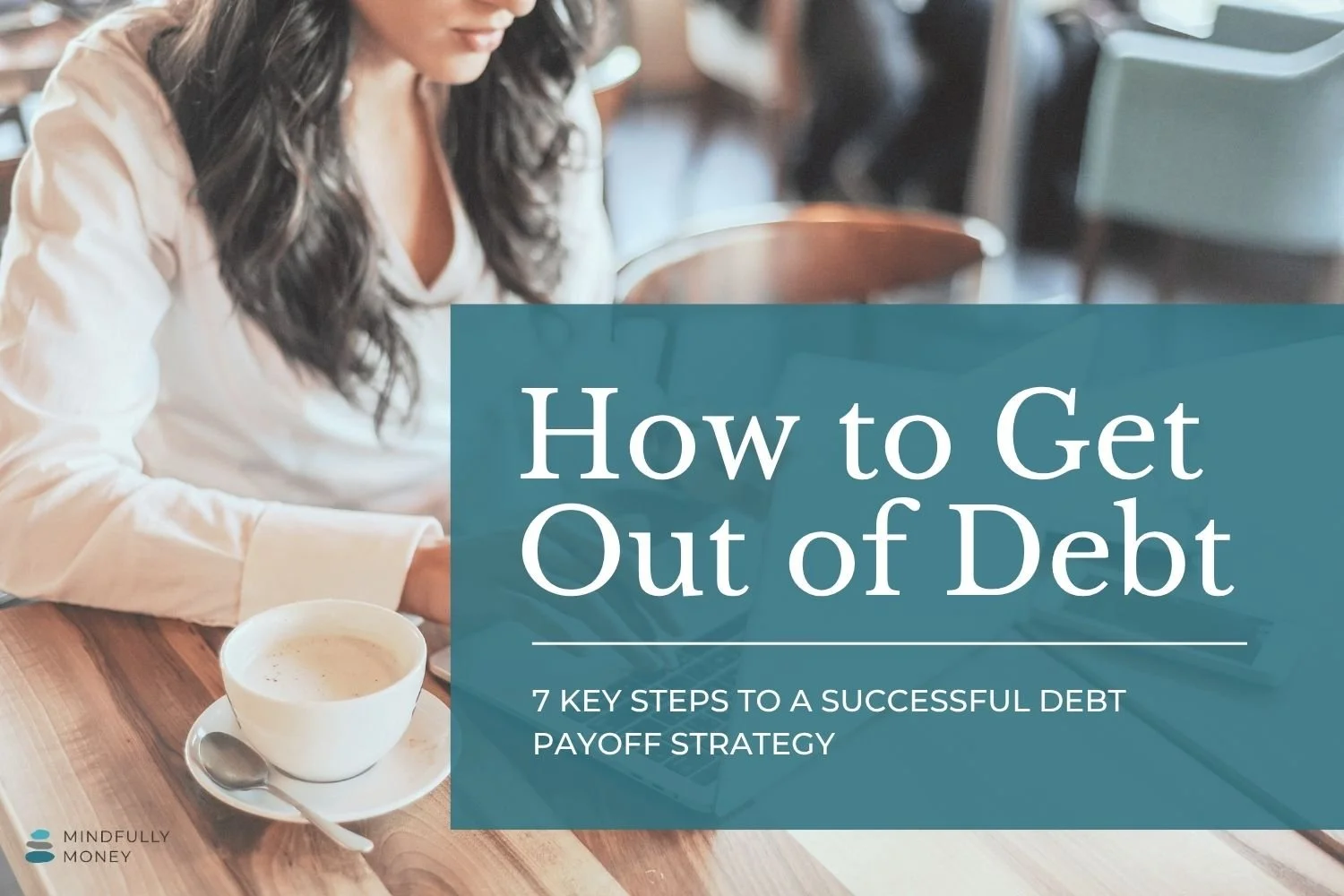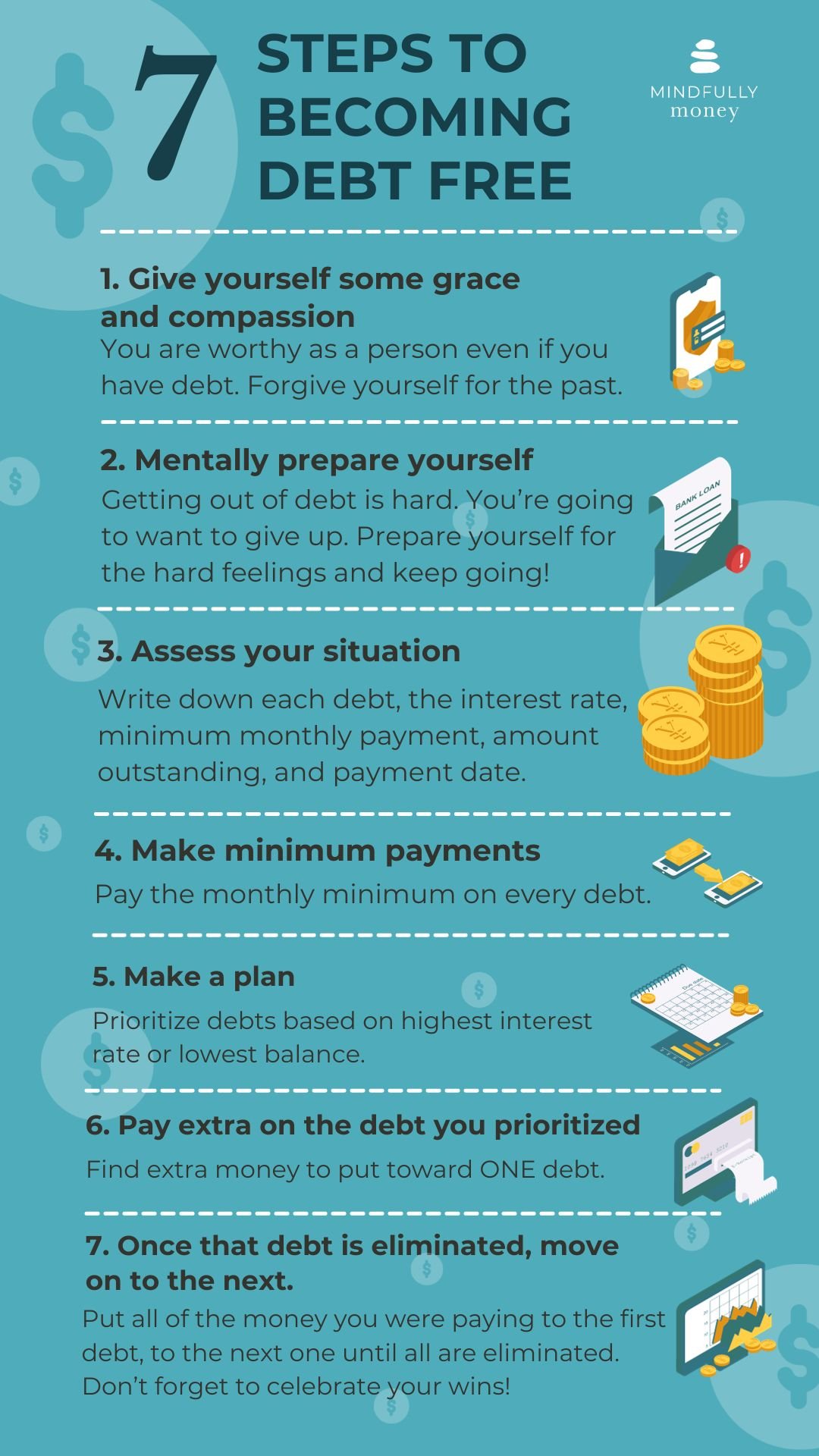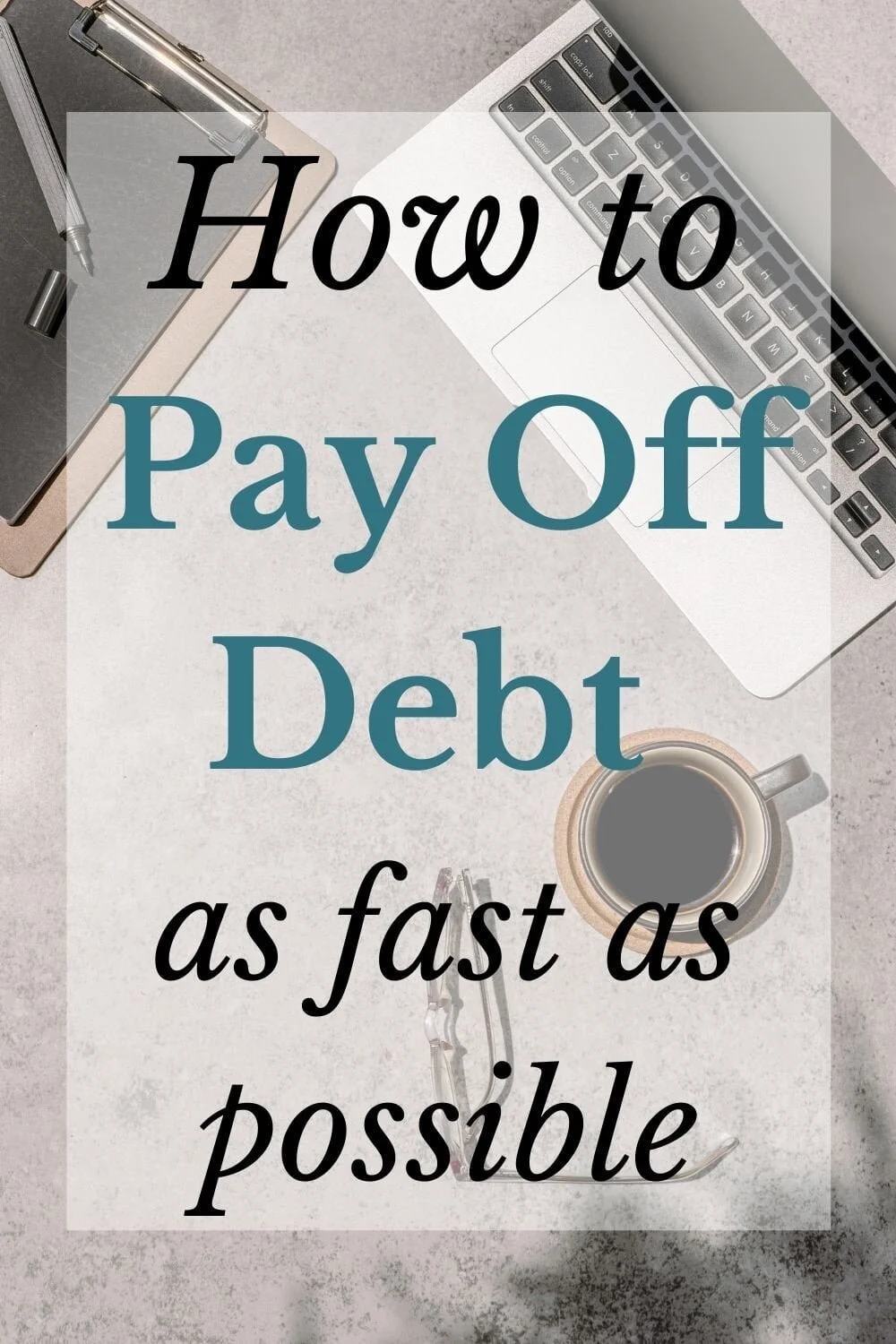How to Get Out of Debt: 7 Steps to Financial Freedom
Figuring out how to get out of debt is challenging financially as well as emotionally. It often comes with a great deal of shame and hopelessness as you struggle to see how you’ll ever get back on track with your finances. It’s hard to want to think about your debt because it sometimes represents hard times you’ve had or bad decisions you’ve made. Overcoming your feelings enough to come up with a plan is often the hardest part of paying off debt.
But there is hope! You can do this!
Many people have successfully paid off debt using the method below. On one level, paying off debt is fairly straightforward: you just have to pay it. But figuring out where to start and how to keep going can be challenging. These debt payoff strategies will help you determine where to start and how to keep going. Before you know it, you’ll be debt-free and ready to start building the life of your dreams!
How to Get Out of Debt
1. Give yourself some grace
Before you do anything else, it’s important to let go (or try to let go) of any shame that you feel around your debt. Debt is not inherently bad. It is not sinful. It does not mean you’re bad with money and it does not make you a bad person.
Every time you start feeling regrets or telling yourself you should have done something differently, stop. You won’t be able to eliminate these thoughts entirely, especially not all at once. It’s going to take practice. But when you notice them happening, I want you to instead tell yourself that your debt says nothing about what kind of person you are.
You were doing the best you could with the information you had at the time. Now you have new information and new circumstances and you’re ready to do something else. Whatever happened in the past stays in the past. This is your chance to forgive yourself and start fresh, and shame has no role in your new journey.
Read More: How to Overcome the Shame of Debt
2. Mentally prepare yourself
Paying off debt is mentally and emotionally challenging. Sometimes it is going to feel like you will never succeed, and you will almost certainly want to give up.
It is normal to feel this way. Your first, and arguably most important job, is to accept that it is difficult and don’t take these feelings as a sign that you should give up. Feeling hopeless and discouraged is a normal part of the process and you CAN get through it!
3. Assess your debt
Looking at your debts and how much you owe can be scary and bring up all those feelings of shame. But in order to pay off debt, you need an accurate picture of how much you owe. This will help you make an effective strategy so you can pay off your debt as quickly as possible.
Start by making a list of all of your debts, the minimum payment, the payment date, the interest rate, and the total balance due. You can use the worksheet in my free Debt Rescue Pack to organize your information.
It may be painful to see it all laid out this way, but don’t be discouraged. Pat yourself on the back for taking the first step in eliminating your debt.
4. Make the minimum payments on each of your debts
When paying off debt, you will continue making the minimum payments on each of your debts.
You can even set up automatic payments from your checking account so you don’t have to think about it each month (as long as you aren’t at risk of overdrawing).
5. Prioritize
The next step is to put extra money (beyond the minimum payment) toward one of your debts, but how do you decide which one?
First, you can pay the debts with the highest interest rates first. This is sometimes referred to as the Debt Avalanche method. Prioritizing debts by interest rate helps you pay off your debt with the least amount of money because the higher interest rate debt doesn’t have as long to accrue more interest. From a pure mathematical standpoint, this is the best way to prioritize which debts to pay off first.
But humans are not computers and what’s rational doesn’t always make sense to our emotional brains. So sometimes it is better to prioritize debt in a way that gives you a bigger win faster and helps motivate you to keep going.
One way to do this is by paying off the debt with the smallest balance first. This method, popularized by Dave Ramsey, is sometimes known as the Debt Snowball. The idea is that the debt with the smallest balance will be paid off the fastest, giving you a greater sense of accomplishment. This method is helpful to many people struggling to stay committed and motivated.
While these are the most common methods, there’s no reason to lock into one or the other. Maybe you pay off the smallest and then move to the one with the highest interest rate. Or you pay off the one that makes you feel the worst.
The important thing is to just pick one and get started. Do what works for you. You can always switch later, but don’t give up!
6. Put as much extra money as you can toward whichever debt you have prioritized
The next step is to find extra money that can be used to pay off your debts. You’re going to find as much money as possible and put it toward whichever debt you prioritized in the previous step.
This likely means that you will need to create a budget if you don’t have one and that you will need to make some sacrifices.
Read More: Why Paying Off Debt Too Fast Can Backfire
Ways to Find More Money for Paying Off Debt
Make More Money
Get a side gig
Ask for a raise
Sell your belongings
Reduce Expenses
Cut out or reduce your spending to necessities only.
Switch plans or companies for things like internet and cell phone. Or, call and ask for a reduced rate.
Exchange your newer expensive car for an older, less expensive car.
Shop around for lower home and auto insurance.
Move to a cheaper house or apartment.
Get a roommate or renter.
Reduce Interest Rates
Once you have a plan for paying off your debt (and have stopped adding to the debt), you can accelerate your progress by trying to reduce your interest rate.
Note: many companies will try to sell you consolidation loans and related products as a complete solution to paying off debt. Most people who try this find that it doesn’t work unless it is part of a larger debt payoff strategy.
Here are some ways to reduce interest rates:
Call your credit card companies and try to negotiate a lower interest rate.
Transfer your balance to a card with 0% interest. This won’t reduce the balance, but it will give you more time to pay without accruing more interest. If you do this, it is extremely important that you have a plan for paying it off.
Consider a personal loan. Sometimes you can combine multiple debts into one payment at a lower interest rate. Again, make sure that you have a plan to pay off your debt.
Read More: The Best (and Worst) Ways to Pay Off Credit Card Debt
7. Eliminate one debt and move to the next
Once you have eliminated your first debt, take all of the money you were paying toward it and put it toward the next highest priority debt. Repeat until all debts are paid off.
Don’t forget to celebrate your wins!
Celebrating every single win, no matter how small, will help you stay motivated. You can celebrate making your plan, freeing up more money for debt, making a decision NOT to buy something, and of course paying off a debt.
Even reading this article on how to get out of debt is something to celebrate because it means you’ve decided to do something about it!
You can use the free worksheet in the Debt Rescue Pack to help you track your debt payoff journey.
When You Still Need Help Paying Off Debt
These steps can help most people eliminate debt, but if you’re still struggling, it’s a good idea to get help.
As a financial coach, I guide people through the process of analyzing their situation, figuring out a plan, finding ways to speed up their journey, and stay motivated. It costs money to work with a coach, but doing so can significantly speed up the time it takes to become debt free because you get guidance that works, emotional support, and accountability to keep you on track. Send me a message if you’d like to set up a free chat to learn more.
There are also many free resources through local government organizations and non-profits that can help you. Start by going to the National Foundation for Credit Counseling to find local resources. Beware of anything that looks too good to be true as there are many scammers out there.
In the end, remember that debt does not make you a bad person. With a solid strategy, a little self compassion, and a LOT of determination, you’ll be on track to financial freedom before you know it!
For more tips and inspiration, check out this collection of resources on how to get out of debt.
Pin for later:






